C&G Level 5 Diploma in Leadership Unit 502: Governance Report
VerifiedAdded on 2023/01/13
|12
|1310
|33
Report
AI Summary
This report examines governance and regulatory processes within the adult care sector, focusing on statutory and legislative requirements, internal governance arrangements, and the demands of regulation. It investigates governance mechanisms and their role in achieving health objectives, emphasizing the importance of management standards. The report evaluates the inspection system in England, detailing the role of the Care Quality Commission (CQC), the key drivers of inspection, and the five key questions used during inspections. It further explores the grading system, outlining the implications of each grade from excellent to unsatisfactory. The report also analyzes the roles and responsibilities of key individuals, including registered care managers, inspectors, and health care auditors. The inspection process itself is examined, including the people involved, the information required, and the processes of self-assessment, inspection visits, feedback, and reporting. The report concludes by summarizing key legislation and policies, such as the Health and Social Care Act and the Care Act, and their impact on protecting rights and maintaining quality standards. The references include various research papers on regulatory practices and governance in healthcare.
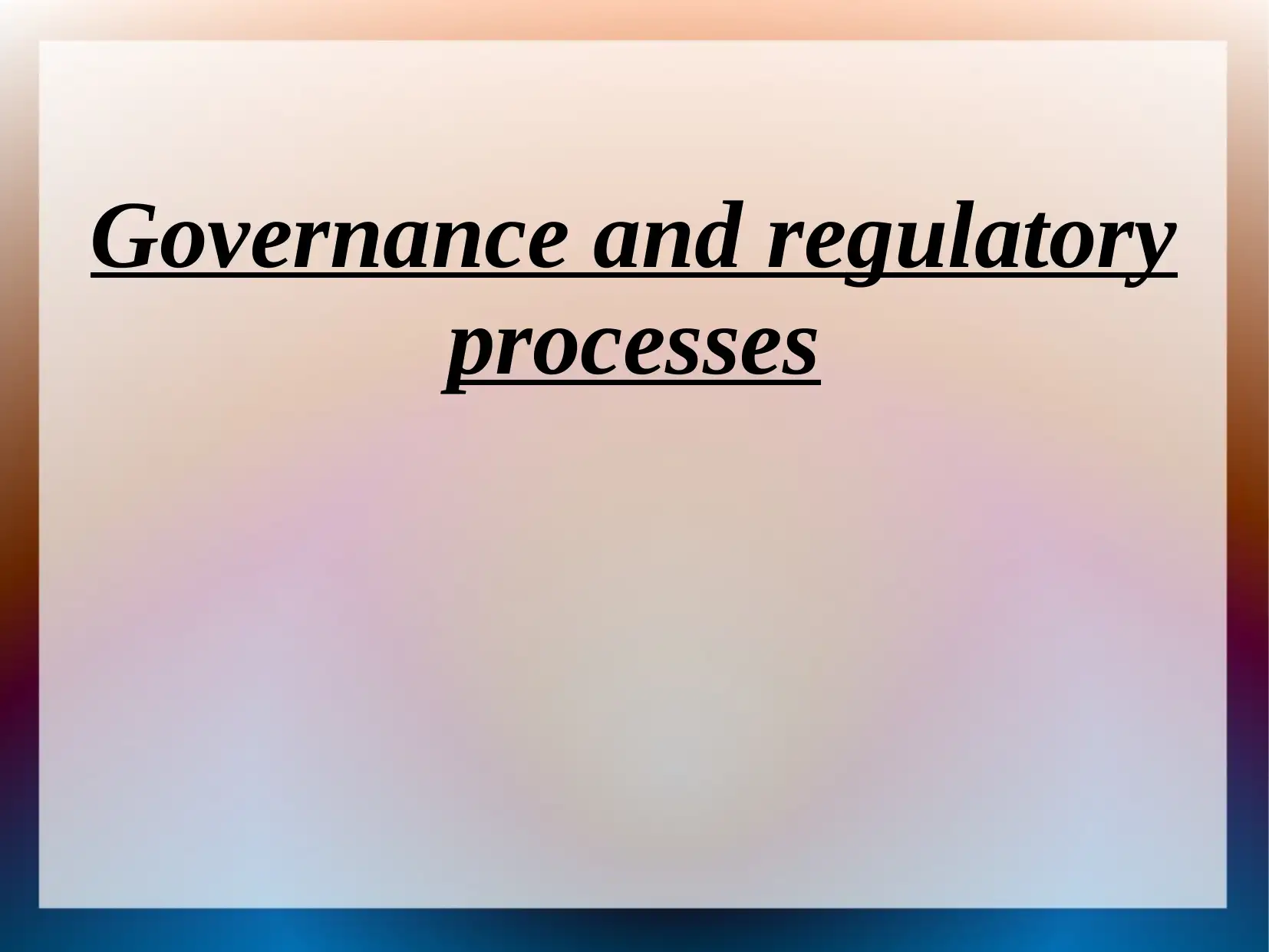
Governance and regulatory
processes
processes
Paraphrase This Document
Need a fresh take? Get an instant paraphrase of this document with our AI Paraphraser
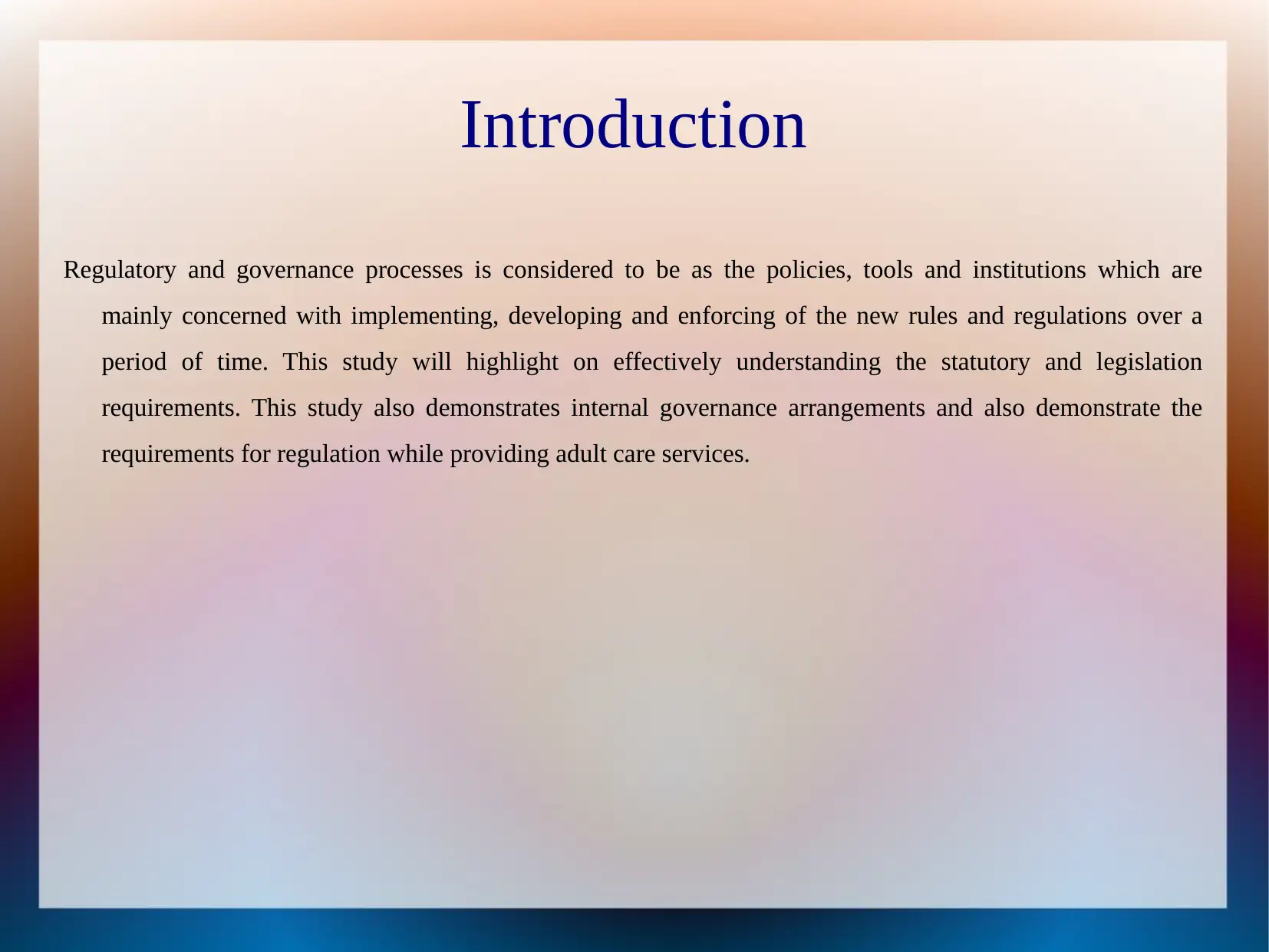
Introduction
Regulatory and governance processes is considered to be as the policies, tools and institutions which are
mainly concerned with implementing, developing and enforcing of the new rules and regulations over a
period of time. This study will highlight on effectively understanding the statutory and legislation
requirements. This study also demonstrates internal governance arrangements and also demonstrate the
requirements for regulation while providing adult care services.
Regulatory and governance processes is considered to be as the policies, tools and institutions which are
mainly concerned with implementing, developing and enforcing of the new rules and regulations over a
period of time. This study will highlight on effectively understanding the statutory and legislation
requirements. This study also demonstrates internal governance arrangements and also demonstrate the
requirements for regulation while providing adult care services.
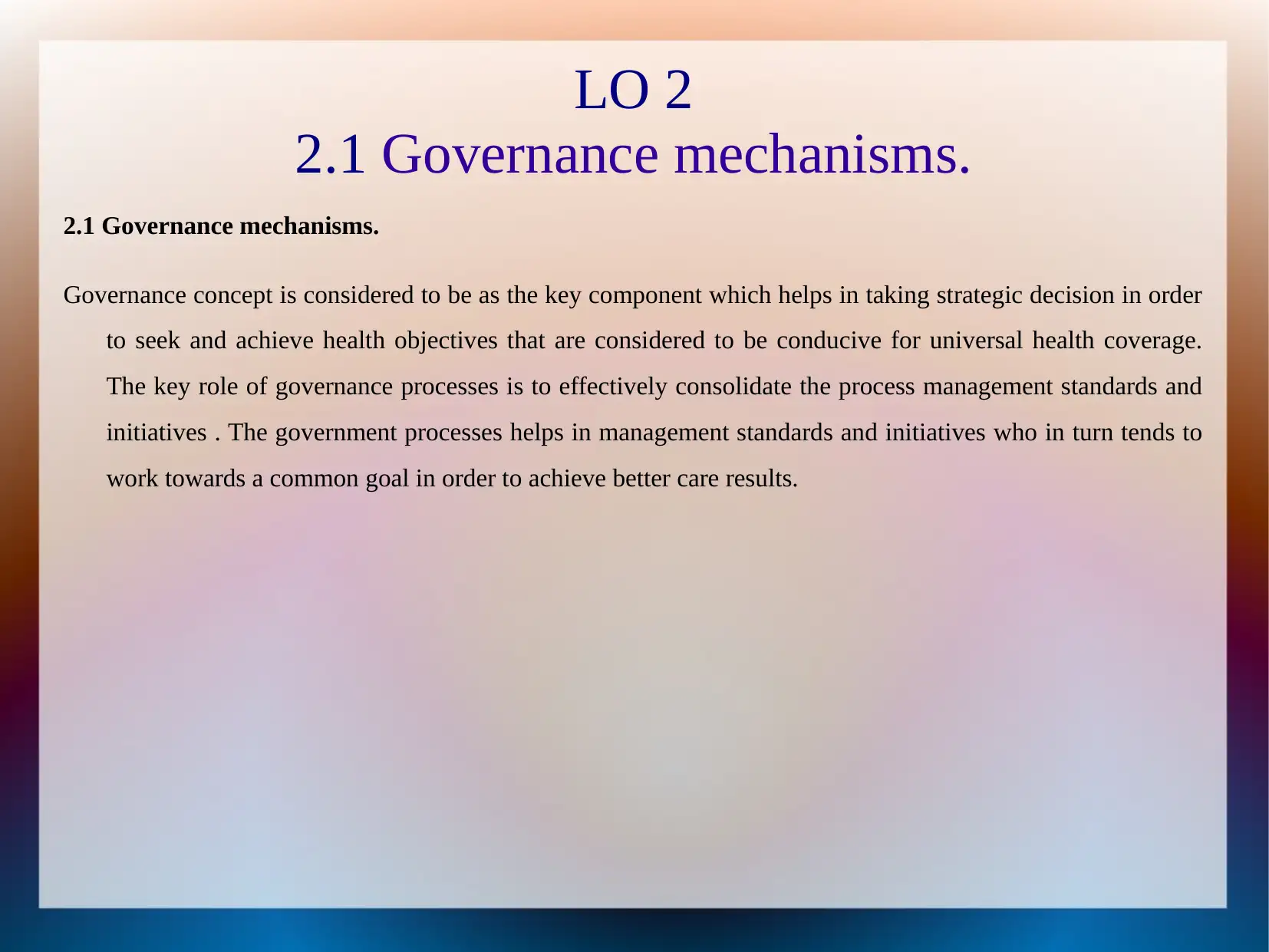
LO 2
2.1 Governance mechanisms.
2.1 Governance mechanisms.
Governance concept is considered to be as the key component which helps in taking strategic decision in order
to seek and achieve health objectives that are considered to be conducive for universal health coverage.
The key role of governance processes is to effectively consolidate the process management standards and
initiatives . The government processes helps in management standards and initiatives who in turn tends to
work towards a common goal in order to achieve better care results.
2.1 Governance mechanisms.
2.1 Governance mechanisms.
Governance concept is considered to be as the key component which helps in taking strategic decision in order
to seek and achieve health objectives that are considered to be conducive for universal health coverage.
The key role of governance processes is to effectively consolidate the process management standards and
initiatives . The government processes helps in management standards and initiatives who in turn tends to
work towards a common goal in order to achieve better care results.
⊘ This is a preview!⊘
Do you want full access?
Subscribe today to unlock all pages.

Trusted by 1+ million students worldwide
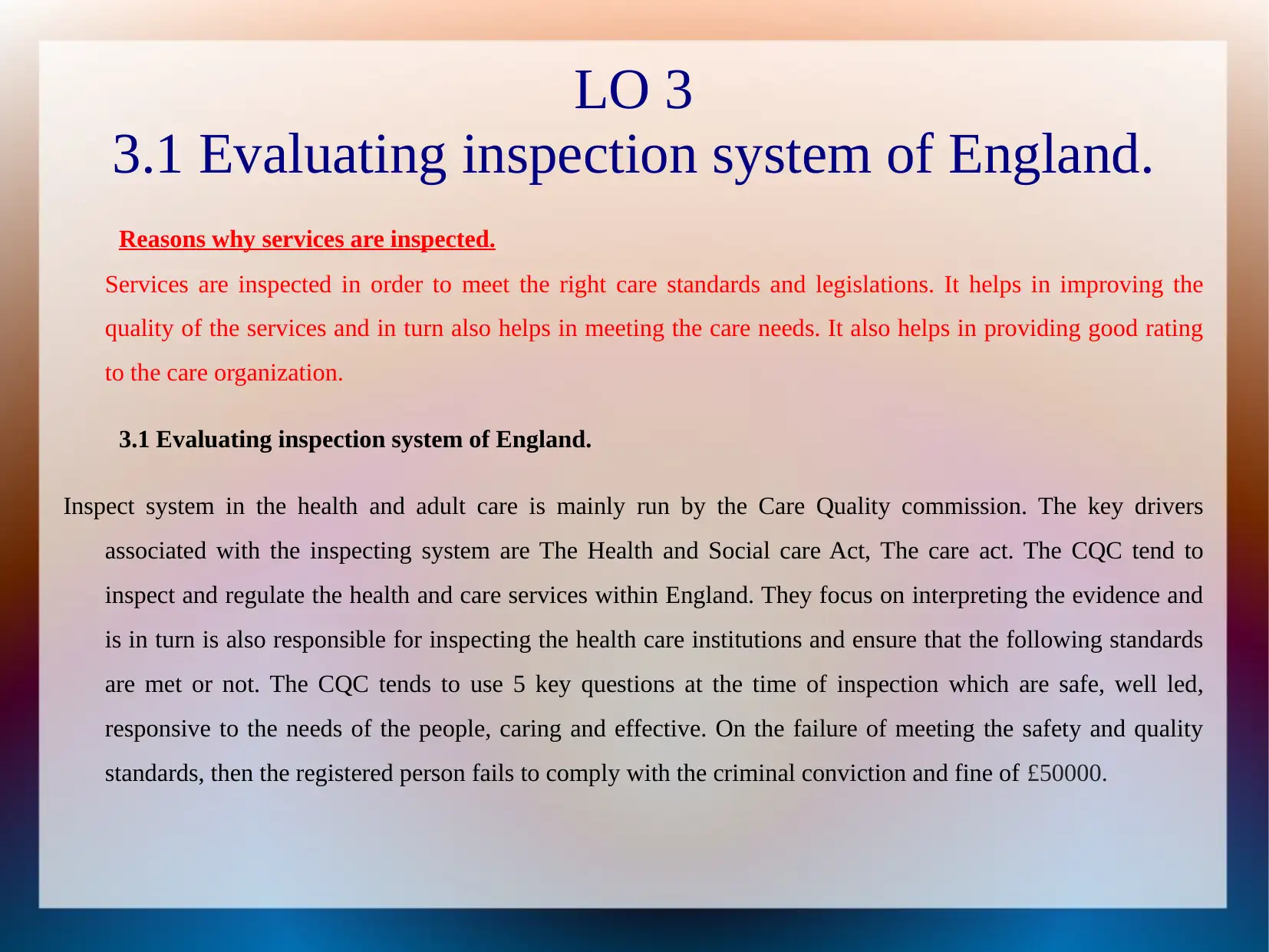
LO 3
3.1 Evaluating inspection system of England.
Reasons why services are inspected.
Services are inspected in order to meet the right care standards and legislations. It helps in improving the
quality of the services and in turn also helps in meeting the care needs. It also helps in providing good rating
to the care organization.
3.1 Evaluating inspection system of England.
Inspect system in the health and adult care is mainly run by the Care Quality commission. The key drivers
associated with the inspecting system are The Health and Social care Act, The care act. The CQC tend to
inspect and regulate the health and care services within England. They focus on interpreting the evidence and
is in turn is also responsible for inspecting the health care institutions and ensure that the following standards
are met or not. The CQC tends to use 5 key questions at the time of inspection which are safe, well led,
responsive to the needs of the people, caring and effective. On the failure of meeting the safety and quality
standards, then the registered person fails to comply with the criminal conviction and fine of £50000.
3.1 Evaluating inspection system of England.
Reasons why services are inspected.
Services are inspected in order to meet the right care standards and legislations. It helps in improving the
quality of the services and in turn also helps in meeting the care needs. It also helps in providing good rating
to the care organization.
3.1 Evaluating inspection system of England.
Inspect system in the health and adult care is mainly run by the Care Quality commission. The key drivers
associated with the inspecting system are The Health and Social care Act, The care act. The CQC tend to
inspect and regulate the health and care services within England. They focus on interpreting the evidence and
is in turn is also responsible for inspecting the health care institutions and ensure that the following standards
are met or not. The CQC tends to use 5 key questions at the time of inspection which are safe, well led,
responsive to the needs of the people, caring and effective. On the failure of meeting the safety and quality
standards, then the registered person fails to comply with the criminal conviction and fine of £50000.
Paraphrase This Document
Need a fresh take? Get an instant paraphrase of this document with our AI Paraphraser
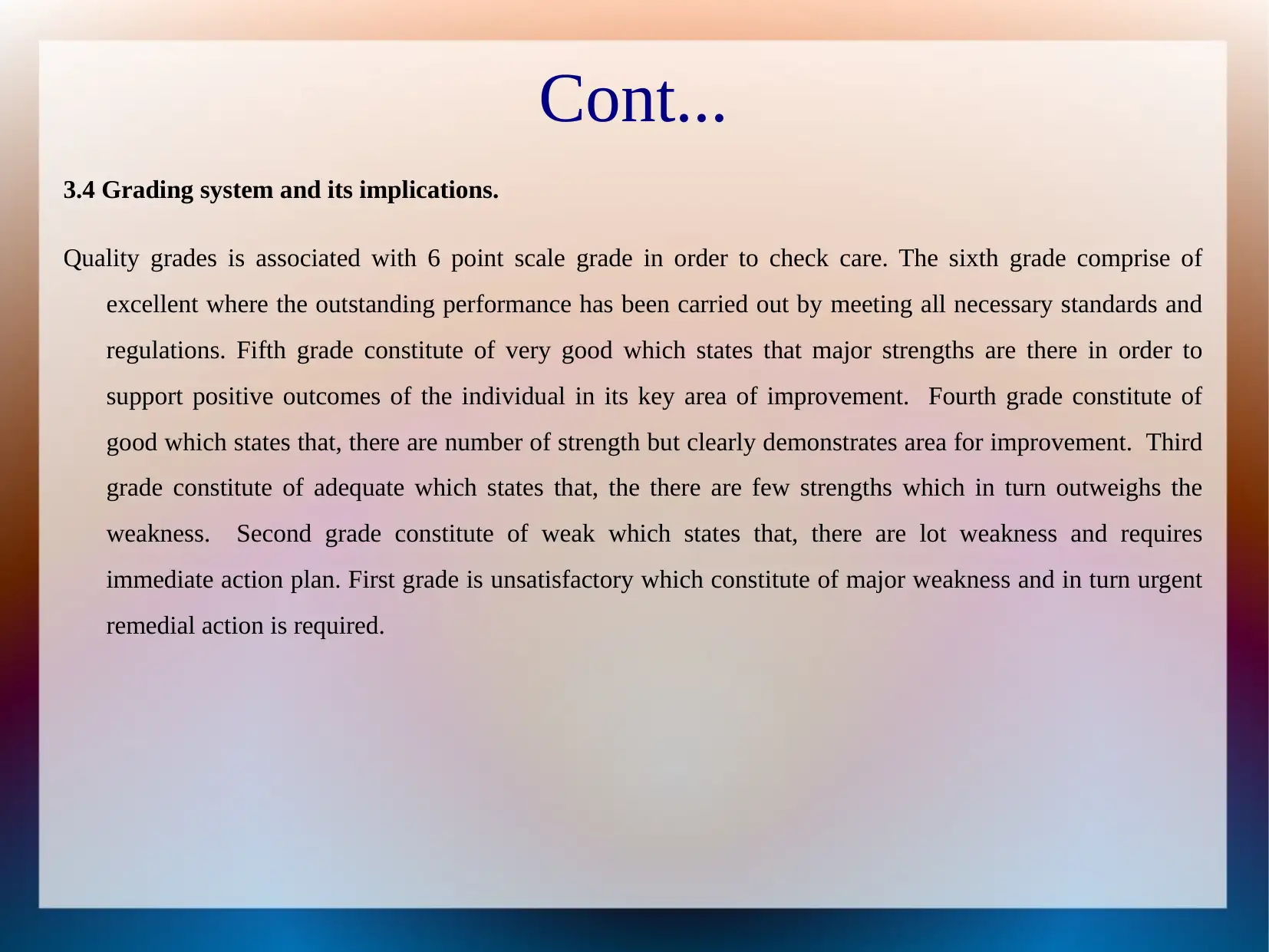
Cont...
3.4 Grading system and its implications.
Quality grades is associated with 6 point scale grade in order to check care. The sixth grade comprise of
excellent where the outstanding performance has been carried out by meeting all necessary standards and
regulations. Fifth grade constitute of very good which states that major strengths are there in order to
support positive outcomes of the individual in its key area of improvement. Fourth grade constitute of
good which states that, there are number of strength but clearly demonstrates area for improvement. Third
grade constitute of adequate which states that, the there are few strengths which in turn outweighs the
weakness. Second grade constitute of weak which states that, there are lot weakness and requires
immediate action plan. First grade is unsatisfactory which constitute of major weakness and in turn urgent
remedial action is required.
3.4 Grading system and its implications.
Quality grades is associated with 6 point scale grade in order to check care. The sixth grade comprise of
excellent where the outstanding performance has been carried out by meeting all necessary standards and
regulations. Fifth grade constitute of very good which states that major strengths are there in order to
support positive outcomes of the individual in its key area of improvement. Fourth grade constitute of
good which states that, there are number of strength but clearly demonstrates area for improvement. Third
grade constitute of adequate which states that, the there are few strengths which in turn outweighs the
weakness. Second grade constitute of weak which states that, there are lot weakness and requires
immediate action plan. First grade is unsatisfactory which constitute of major weakness and in turn urgent
remedial action is required.
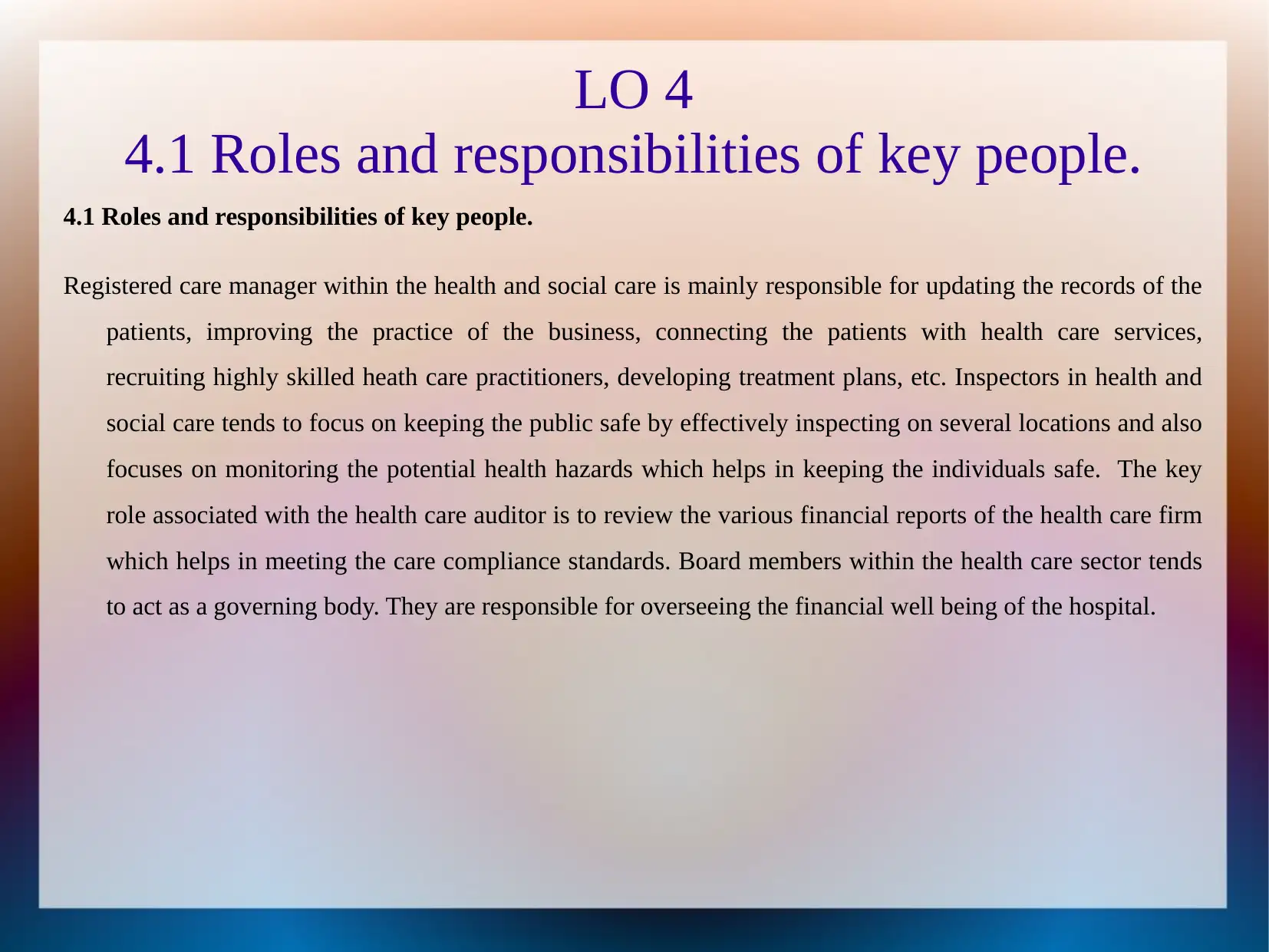
LO 4
4.1 Roles and responsibilities of key people.
4.1 Roles and responsibilities of key people.
Registered care manager within the health and social care is mainly responsible for updating the records of the
patients, improving the practice of the business, connecting the patients with health care services,
recruiting highly skilled heath care practitioners, developing treatment plans, etc. Inspectors in health and
social care tends to focus on keeping the public safe by effectively inspecting on several locations and also
focuses on monitoring the potential health hazards which helps in keeping the individuals safe. The key
role associated with the health care auditor is to review the various financial reports of the health care firm
which helps in meeting the care compliance standards. Board members within the health care sector tends
to act as a governing body. They are responsible for overseeing the financial well being of the hospital.
4.1 Roles and responsibilities of key people.
4.1 Roles and responsibilities of key people.
Registered care manager within the health and social care is mainly responsible for updating the records of the
patients, improving the practice of the business, connecting the patients with health care services,
recruiting highly skilled heath care practitioners, developing treatment plans, etc. Inspectors in health and
social care tends to focus on keeping the public safe by effectively inspecting on several locations and also
focuses on monitoring the potential health hazards which helps in keeping the individuals safe. The key
role associated with the health care auditor is to review the various financial reports of the health care firm
which helps in meeting the care compliance standards. Board members within the health care sector tends
to act as a governing body. They are responsible for overseeing the financial well being of the hospital.
⊘ This is a preview!⊘
Do you want full access?
Subscribe today to unlock all pages.

Trusted by 1+ million students worldwide
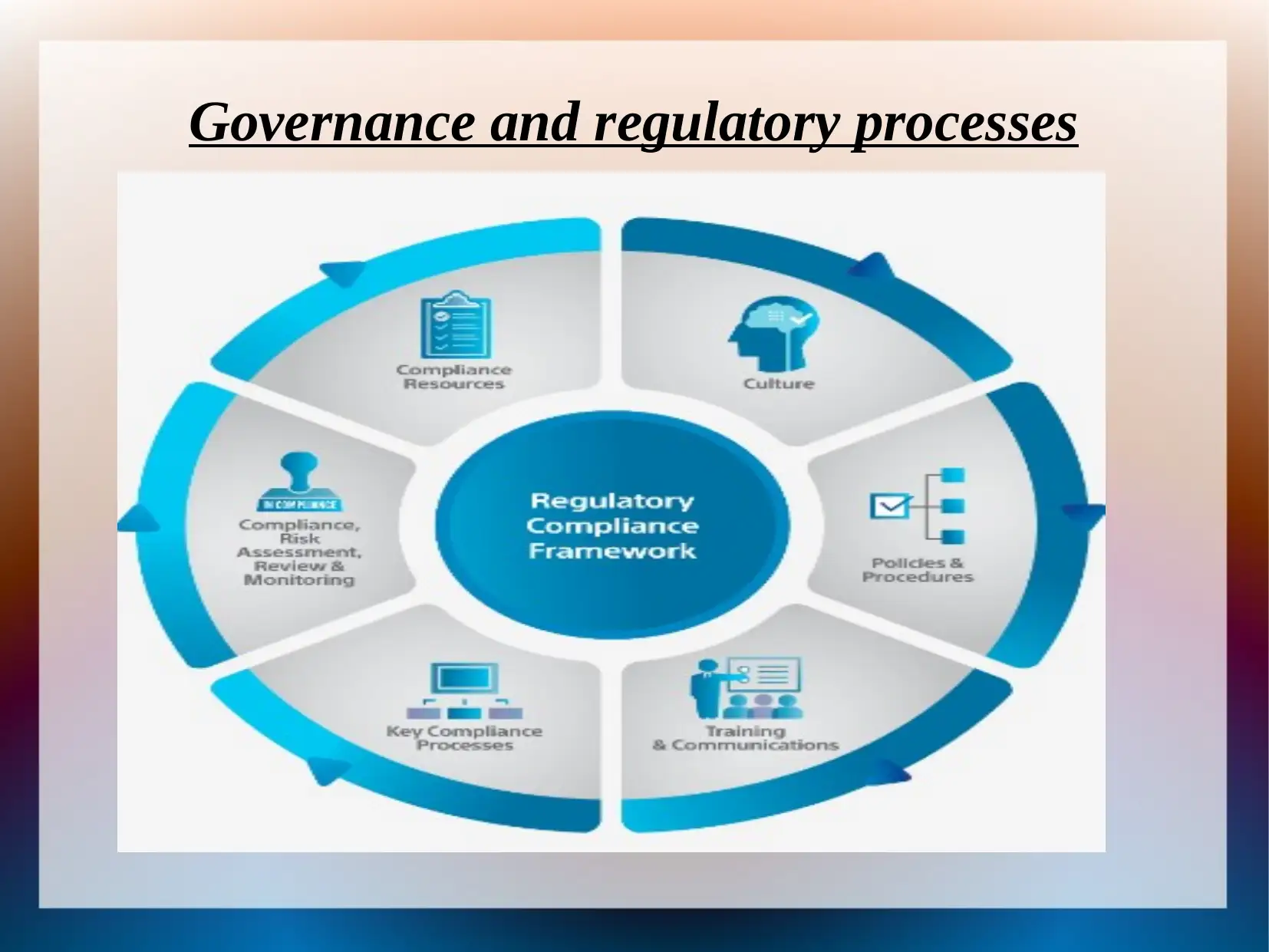
Governance and regulatory processes
Paraphrase This Document
Need a fresh take? Get an instant paraphrase of this document with our AI Paraphraser
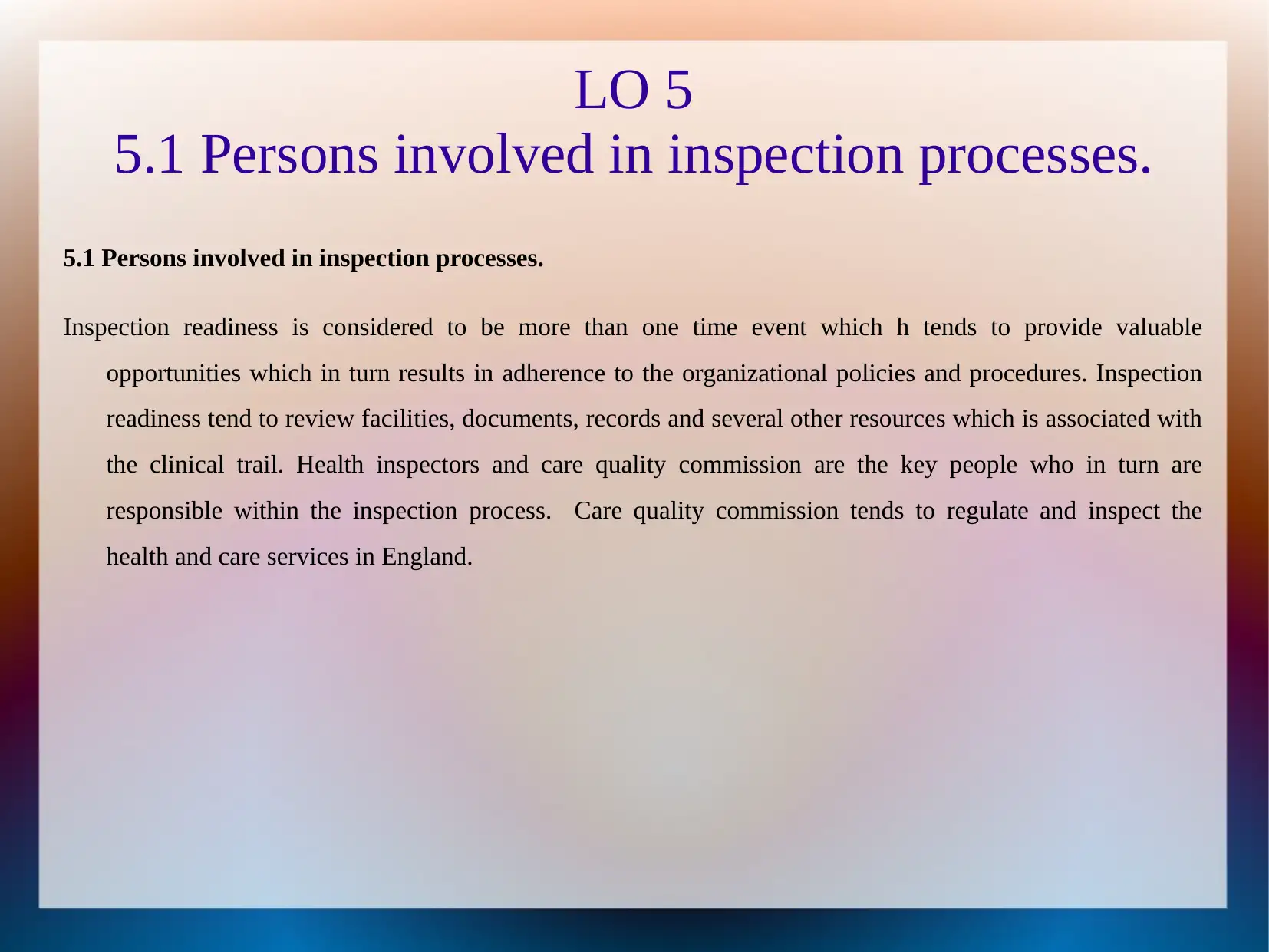
LO 5
5.1 Persons involved in inspection processes.
5.1 Persons involved in inspection processes.
Inspection readiness is considered to be more than one time event which h tends to provide valuable
opportunities which in turn results in adherence to the organizational policies and procedures. Inspection
readiness tend to review facilities, documents, records and several other resources which is associated with
the clinical trail. Health inspectors and care quality commission are the key people who in turn are
responsible within the inspection process. Care quality commission tends to regulate and inspect the
health and care services in England.
5.1 Persons involved in inspection processes.
5.1 Persons involved in inspection processes.
Inspection readiness is considered to be more than one time event which h tends to provide valuable
opportunities which in turn results in adherence to the organizational policies and procedures. Inspection
readiness tend to review facilities, documents, records and several other resources which is associated with
the clinical trail. Health inspectors and care quality commission are the key people who in turn are
responsible within the inspection process. Care quality commission tends to regulate and inspect the
health and care services in England.
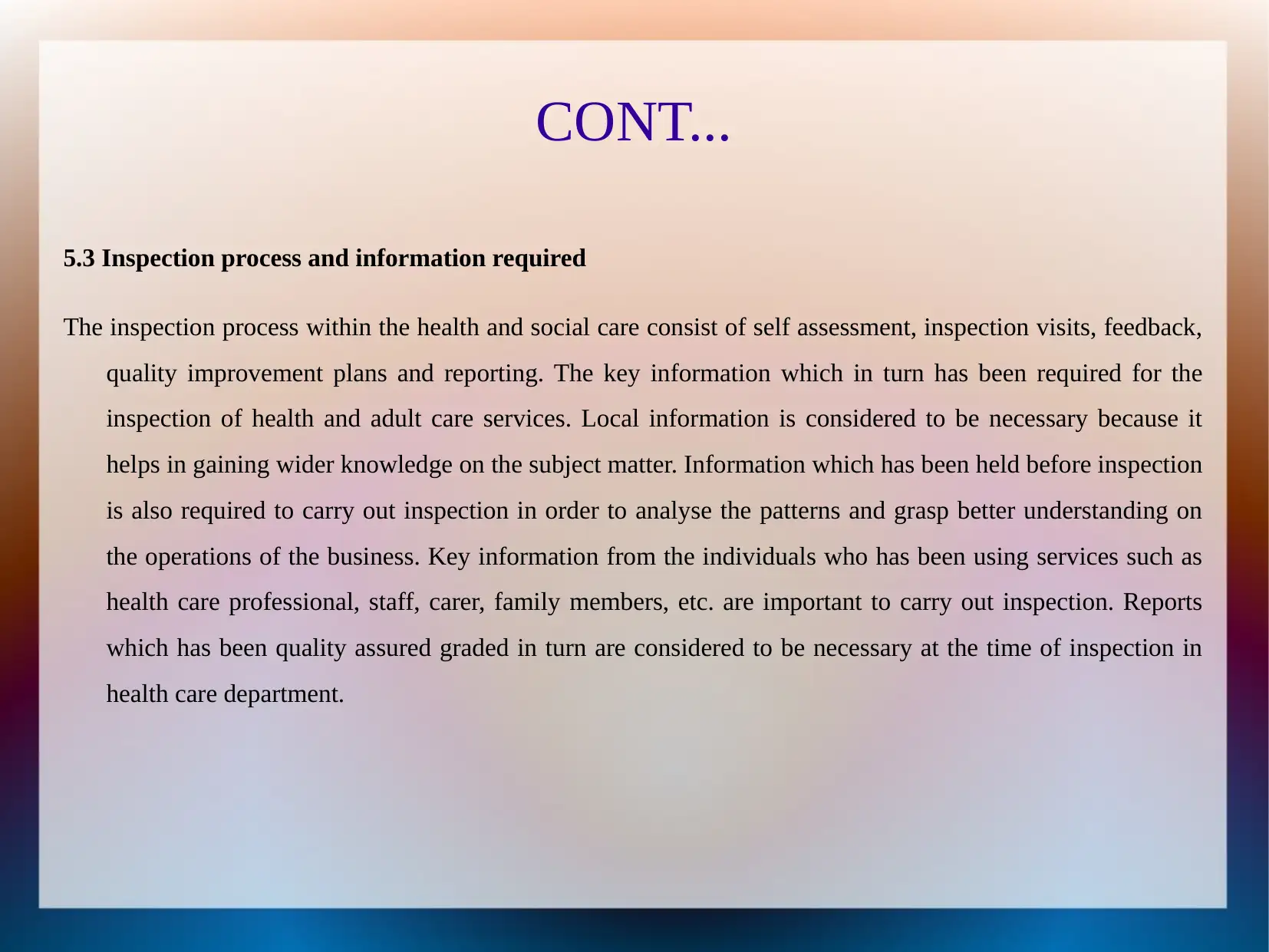
CONT...
5.3 Inspection process and information required
The inspection process within the health and social care consist of self assessment, inspection visits, feedback,
quality improvement plans and reporting. The key information which in turn has been required for the
inspection of health and adult care services. Local information is considered to be necessary because it
helps in gaining wider knowledge on the subject matter. Information which has been held before inspection
is also required to carry out inspection in order to analyse the patterns and grasp better understanding on
the operations of the business. Key information from the individuals who has been using services such as
health care professional, staff, carer, family members, etc. are important to carry out inspection. Reports
which has been quality assured graded in turn are considered to be necessary at the time of inspection in
health care department.
5.3 Inspection process and information required
The inspection process within the health and social care consist of self assessment, inspection visits, feedback,
quality improvement plans and reporting. The key information which in turn has been required for the
inspection of health and adult care services. Local information is considered to be necessary because it
helps in gaining wider knowledge on the subject matter. Information which has been held before inspection
is also required to carry out inspection in order to analyse the patterns and grasp better understanding on
the operations of the business. Key information from the individuals who has been using services such as
health care professional, staff, carer, family members, etc. are important to carry out inspection. Reports
which has been quality assured graded in turn are considered to be necessary at the time of inspection in
health care department.
⊘ This is a preview!⊘
Do you want full access?
Subscribe today to unlock all pages.

Trusted by 1+ million students worldwide
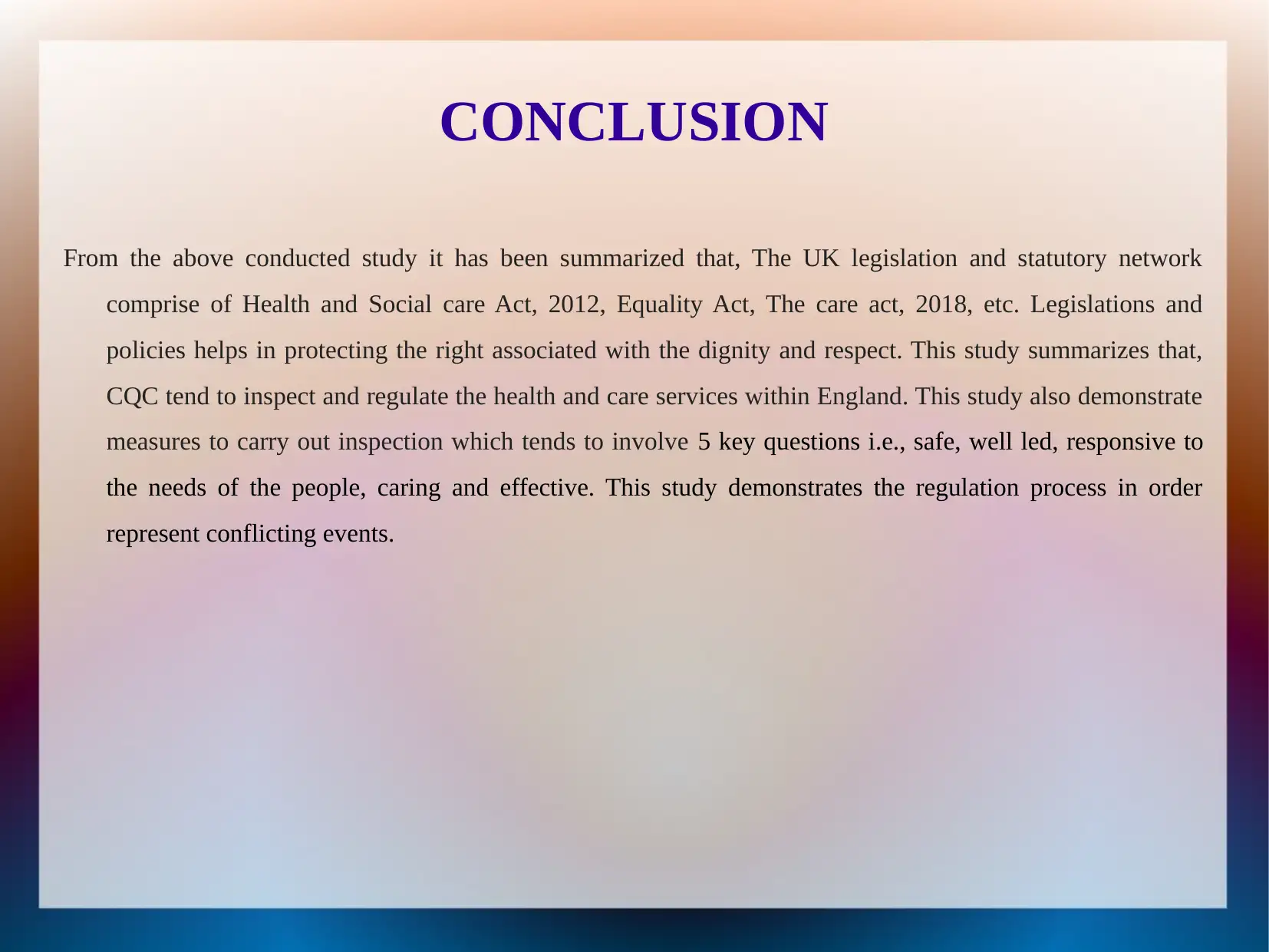
CONCLUSION
From the above conducted study it has been summarized that, The UK legislation and statutory network
comprise of Health and Social care Act, 2012, Equality Act, The care act, 2018, etc. Legislations and
policies helps in protecting the right associated with the dignity and respect. This study summarizes that,
CQC tend to inspect and regulate the health and care services within England. This study also demonstrate
measures to carry out inspection which tends to involve 5 key questions i.e., safe, well led, responsive to
the needs of the people, caring and effective. This study demonstrates the regulation process in order
represent conflicting events.
From the above conducted study it has been summarized that, The UK legislation and statutory network
comprise of Health and Social care Act, 2012, Equality Act, The care act, 2018, etc. Legislations and
policies helps in protecting the right associated with the dignity and respect. This study summarizes that,
CQC tend to inspect and regulate the health and care services within England. This study also demonstrate
measures to carry out inspection which tends to involve 5 key questions i.e., safe, well led, responsive to
the needs of the people, caring and effective. This study demonstrates the regulation process in order
represent conflicting events.
Paraphrase This Document
Need a fresh take? Get an instant paraphrase of this document with our AI Paraphraser
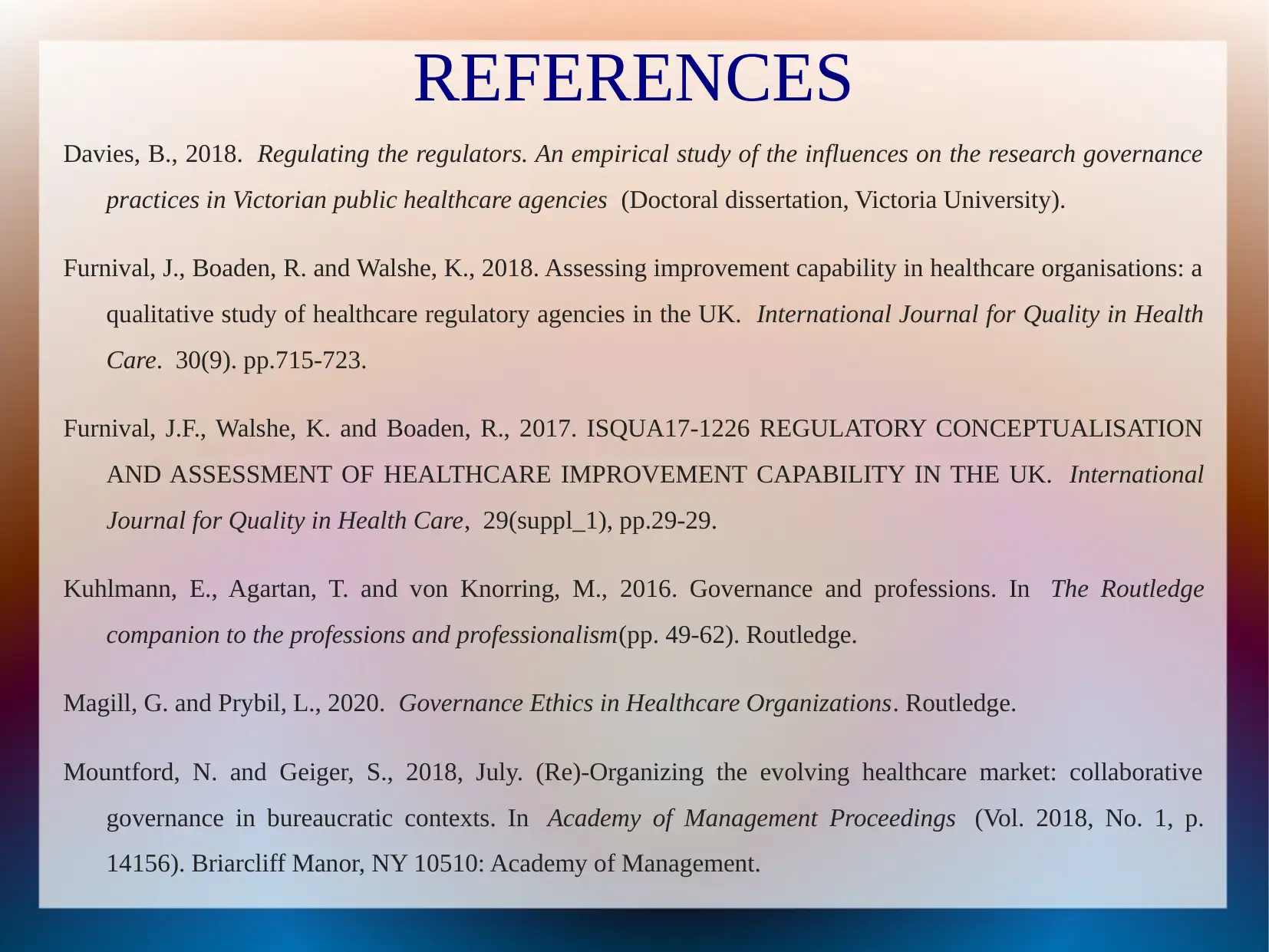
REFERENCES
Davies, B., 2018. Regulating the regulators. An empirical study of the influences on the research governance
practices in Victorian public healthcare agencies (Doctoral dissertation, Victoria University).
Furnival, J., Boaden, R. and Walshe, K., 2018. Assessing improvement capability in healthcare organisations: a
qualitative study of healthcare regulatory agencies in the UK. International Journal for Quality in Health
Care. 30(9). pp.715-723.
Furnival, J.F., Walshe, K. and Boaden, R., 2017. ISQUA17-1226 REGULATORY CONCEPTUALISATION
AND ASSESSMENT OF HEALTHCARE IMPROVEMENT CAPABILITY IN THE UK. International
Journal for Quality in Health Care, 29(suppl_1), pp.29-29.
Kuhlmann, E., Agartan, T. and von Knorring, M., 2016. Governance and professions. In The Routledge
companion to the professions and professionalism(pp. 49-62). Routledge.
Magill, G. and Prybil, L., 2020. Governance Ethics in Healthcare Organizations. Routledge.
Mountford, N. and Geiger, S., 2018, July. (Re)-Organizing the evolving healthcare market: collaborative
governance in bureaucratic contexts. In Academy of Management Proceedings (Vol. 2018, No. 1, p.
14156). Briarcliff Manor, NY 10510: Academy of Management.
Davies, B., 2018. Regulating the regulators. An empirical study of the influences on the research governance
practices in Victorian public healthcare agencies (Doctoral dissertation, Victoria University).
Furnival, J., Boaden, R. and Walshe, K., 2018. Assessing improvement capability in healthcare organisations: a
qualitative study of healthcare regulatory agencies in the UK. International Journal for Quality in Health
Care. 30(9). pp.715-723.
Furnival, J.F., Walshe, K. and Boaden, R., 2017. ISQUA17-1226 REGULATORY CONCEPTUALISATION
AND ASSESSMENT OF HEALTHCARE IMPROVEMENT CAPABILITY IN THE UK. International
Journal for Quality in Health Care, 29(suppl_1), pp.29-29.
Kuhlmann, E., Agartan, T. and von Knorring, M., 2016. Governance and professions. In The Routledge
companion to the professions and professionalism(pp. 49-62). Routledge.
Magill, G. and Prybil, L., 2020. Governance Ethics in Healthcare Organizations. Routledge.
Mountford, N. and Geiger, S., 2018, July. (Re)-Organizing the evolving healthcare market: collaborative
governance in bureaucratic contexts. In Academy of Management Proceedings (Vol. 2018, No. 1, p.
14156). Briarcliff Manor, NY 10510: Academy of Management.

Thank You
⊘ This is a preview!⊘
Do you want full access?
Subscribe today to unlock all pages.

Trusted by 1+ million students worldwide
1 out of 12
Related Documents
Your All-in-One AI-Powered Toolkit for Academic Success.
+13062052269
info@desklib.com
Available 24*7 on WhatsApp / Email
![[object Object]](/_next/static/media/star-bottom.7253800d.svg)
Unlock your academic potential
Copyright © 2020–2026 A2Z Services. All Rights Reserved. Developed and managed by ZUCOL.





